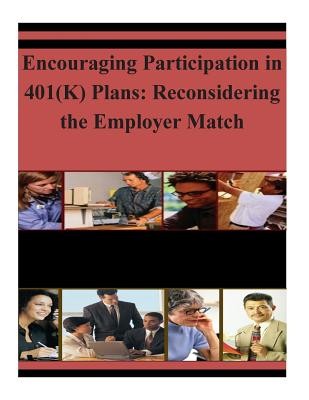
- We will send in 10–14 business days.
- Author: U S Department of Labor
- Publisher: CreateSpace Independent Publishing Platform
- Year: 2014
- Pages: 46
- ISBN-10: 1503332942
- ISBN-13: 9781503332942
- Format: 21.6 x 28 x 0.3 cm, minkšti viršeliai
- Language: English
- SAVE -10% with code: EXTRA
Encouraging Participation in 401(K) Plans (e-book) (used book) | bookbook.eu
Reviews
Description
This book offers new evidence on the effects of plan provisions on 401(k) participation rates, exploiting microdata from the National Compensation Survey, a large, nationally representative, establishment dataset. In particular, it closely considers the observed effects of the matching contributions made by employers to plan accounts, and makes direct comparisons between these effects and those of other plan provisions thought to affect participation: the availability of participant control over plan investment allocations; the option of drawing loans from plan accounts; and, especially, the institution of automatic enrollment in plans. The study first places these effects within a broadly sketched theoretical model in which plan participation and the match rate are jointly determined. This model puts results from the previous literature into context and helps define the "treatment effects" that different parties may find of interest. It then addresses the potential endogeneity affecting measurement of these treatment effects by employing several different techniques: adding previously unused controls; distinguishing between different dimensions of the match; and employing instrumental variables. The results of this analysis indicate that the effects of plan provisions vary dramatically between different income groups. The results among workers in the lowest income group comport with a growing consensus in the literature: employer matches have little or no effect on participation, while automatic enrollment has dramatic effects. But among workers in the middle income group, employer matches have substantial effects that may be larger than the effects of automatic enrollment.
EXTRA 10 % discount with code: EXTRA
The promotion ends in 23d.00:50:06
The discount code is valid when purchasing from 10 €. Discounts do not stack.
- Author: U S Department of Labor
- Publisher: CreateSpace Independent Publishing Platform
- Year: 2014
- Pages: 46
- ISBN-10: 1503332942
- ISBN-13: 9781503332942
- Format: 21.6 x 28 x 0.3 cm, minkšti viršeliai
- Language: English English
This book offers new evidence on the effects of plan provisions on 401(k) participation rates, exploiting microdata from the National Compensation Survey, a large, nationally representative, establishment dataset. In particular, it closely considers the observed effects of the matching contributions made by employers to plan accounts, and makes direct comparisons between these effects and those of other plan provisions thought to affect participation: the availability of participant control over plan investment allocations; the option of drawing loans from plan accounts; and, especially, the institution of automatic enrollment in plans. The study first places these effects within a broadly sketched theoretical model in which plan participation and the match rate are jointly determined. This model puts results from the previous literature into context and helps define the "treatment effects" that different parties may find of interest. It then addresses the potential endogeneity affecting measurement of these treatment effects by employing several different techniques: adding previously unused controls; distinguishing between different dimensions of the match; and employing instrumental variables. The results of this analysis indicate that the effects of plan provisions vary dramatically between different income groups. The results among workers in the lowest income group comport with a growing consensus in the literature: employer matches have little or no effect on participation, while automatic enrollment has dramatic effects. But among workers in the middle income group, employer matches have substantial effects that may be larger than the effects of automatic enrollment.


Reviews